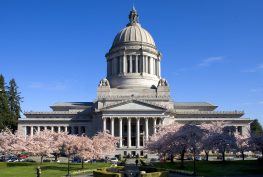Dear Neighbors,
Happy Valentine’s Day! This session is sailing by, and we’re fast approaching some key deadlines. The end of next week marks policy cutoff in the Legislature. This means if a non-financial bill doesn’t pass out of its policy committee by the end of next week, we likely won’t hear it on the floor. The next important milestone is fiscal cutoff—bills with a financial impact must advance out of the Ways & Means and Transportation committees by this deadline to stay in play. Following that is house of origin cutoff—stay tuned.
This week, I testified on one of my own bills—SJM 8002, and two more passed the floor. SJM 8004 passed with 30 yeas and 19 nays and SB 5104 passed with 40 yeas and 9 nays. Both bills are headed over to the House!

Day of Remembrance
Day of Remembrance, a day commemorating the incarceration of Japanese Americans during World War II, is next Wednesday. Rep. Sharon Tomiko Santos and I are gathering with impacted community members, including World War II veterans and former incarcerees and we’ll pass floor resolutions in both chambers to recognize and reflect on these events so we never let it happen again.
New bills
I introduced three new bills, SBs 5744, 5754, and 5753, which would authorize a study of switching to a full-time legislature, create a state bank (more on that below), and establish a public housing task force. Voters in Seattle overwhelmingly supported public housing (social housing) this week and it’s time to expand the program to the rest of the state (and a public bank could finance it)! Public housing is the only way we can create sufficient supply to offset demand and keep costs down.
Public banking – SB 5754
One of the most important policies I’ve worked on over the past several years is creating a publicly owned Washington state depository bank – an idea that would ensure our tax dollars go to work for us here in Washington, rather than paying interest to big banks on Wall Street.
A Washington state bank would operate like any other bank – it would hold money (our tax revenue) as deposits and use those deposits to back loans that it makes. The difference is the customers would be our own state and local governments. Government bank accounts would act as the deposit backing for the loans, which would go out to the state, cities, and counties for the infrastructure investments we need to make on behalf of our constituents.
In practice, this means we could have lower interest rates for infrastructure projects. Construction costs are climbing across the board, and interest is a huge part of the price tag. This means every dollar not spent on interest can go to housing, schools, roads, broadband, climate resilience, healthcare, and other priorities.
This also means that Washington dollars stay in Washington and no one profits off of your hard-earned money. All money taken in by the bank cycles right back into projects that make Washington a better place to live.
Right now, North Dakota is the only state in country with a public bank, which has been serving the state since 1919 and provides us with a proven working model. Washington state is in a fiscal crisis. The state bank can be a big part of a long term solution.
Stay in touch
Join my Intro Sheet Club to see new bill introductions. If there is one you’d like me to sign onto, reach out to my office!
Thank you to everyone who continues to testify in hearings, sign for or against bills, and call and email my office! Your input is invaluable and a crucial aspect of my decision-making process (and at times, the highlight of my day).
Phone: 360-786-7616 (during regular business hours; 8 a.m. to 5 p.m.)
Email me!
Follow me on Facebook.
That’s all for now! Thank you for following along. As always, it’s an honor to serve the 11th Legislative District, and I’m so proud to represent you all.
Talk to you again soon,
Bob
